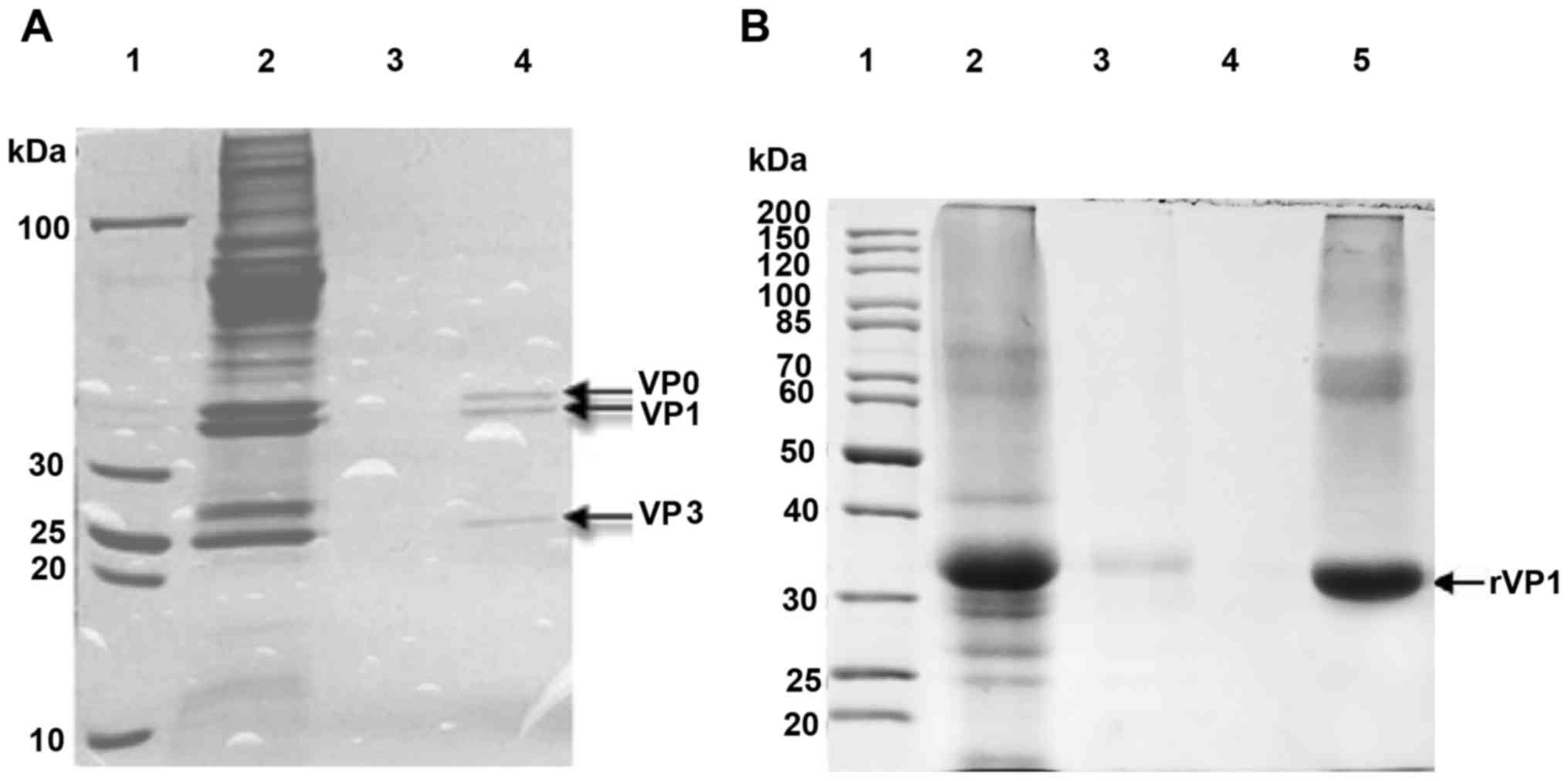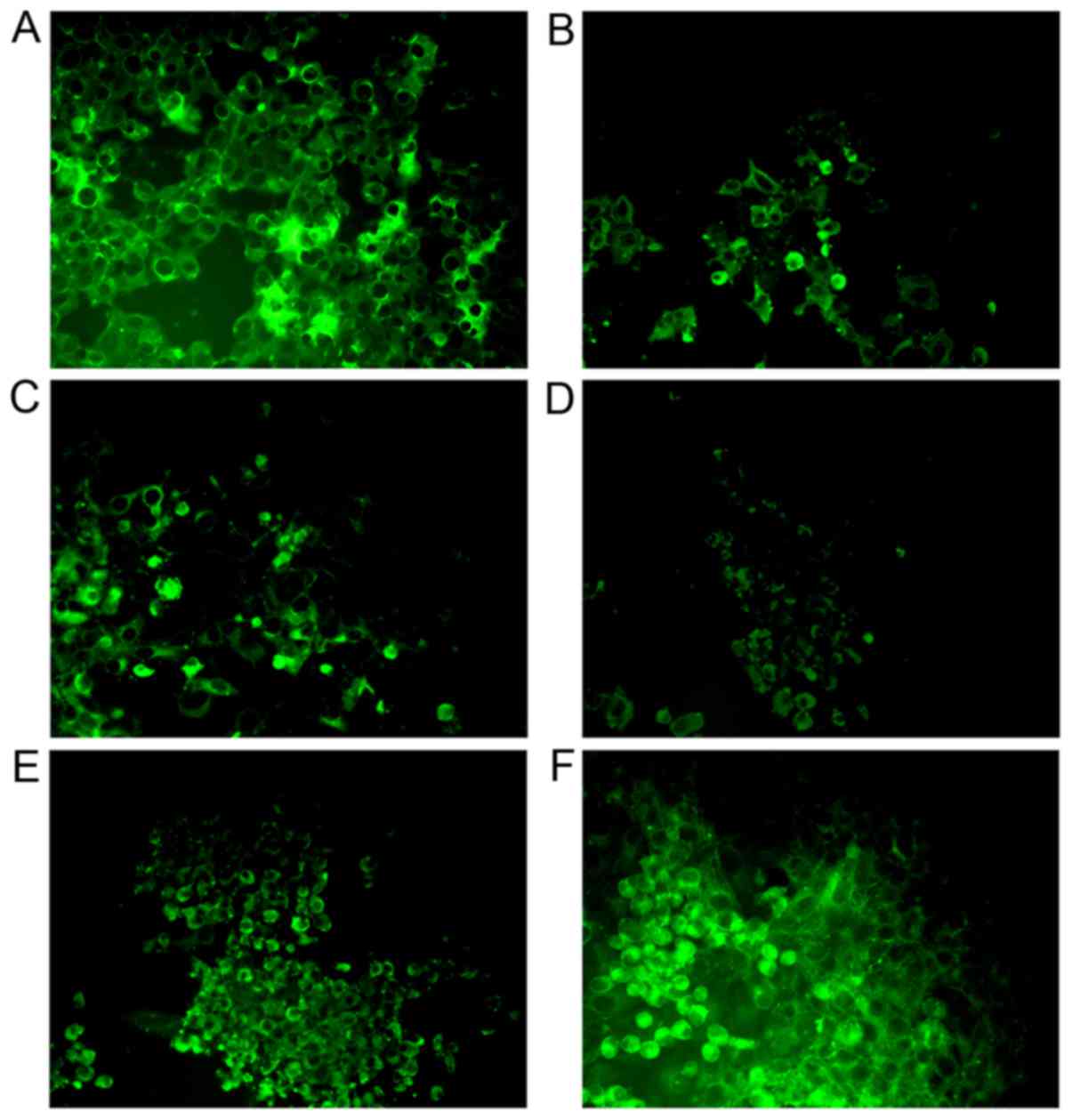|
1
|
Sanders SA, Herrero LJ, McPhie K, Chow SS,
Craig ME, Dwyer DE, Rawlinson W and McMinn PC: Molecular
epidemiology of enterovirus 71 over two decades in an Australian
urban community. Arch Virol. 151:1003–1013. 2006. View Article : Google Scholar : PubMed/NCBI
|
|
2
|
Sato C, Syoji M, Ueki Y, Sato Y, Okimura
Y, Saito N, Kikuchi N, Yagi T and Numakura H: Isolation of
enterovirus 71 from patients with hand, foot and mouth disease in a
local epidemic on March 2006, in Miyagi prefecture, Japan. Jpn J
Infect Dis. 59:3482006.PubMed/NCBI
|
|
3
|
Chang LY: Enterovirus 71 in Taiwan.
Pediatr Neonatol. 49:103–112. 2008. View Article : Google Scholar : PubMed/NCBI
|
|
4
|
Tee KK, Takebe Y and Kamarulzaman A:
Emerging and re-emerging viruses in Malaysia, 1997–2007. Int J
Infect Dis. 13:307–318. 2009. View Article : Google Scholar : PubMed/NCBI
|
|
5
|
Lum LC, Wong KT, Lam SK, Chua KB and Goh
AY: Neurogenic pulmonary oedema and enterovirus 71
encephalomyelitis. Lancet. 352:13911998. View Article : Google Scholar : PubMed/NCBI
|
|
6
|
Mao LX, Wu B, Bao WX, Han FA, Xu L, Ge QJ,
Yang J, Yuan ZH, Miao CH, Huang XX, et al: Epidemiology of hand,
foot, and mouth disease and genotype characterization of
enterovirus 71 in Jiangsu, China. J Clin Virol. 49:100–104. 2010.
View Article : Google Scholar : PubMed/NCBI
|
|
7
|
Zhang Y, Tan XJ, Wang HY, Yan DM, Zhu SL,
Wang DY, Ji F, Wang XJ, Gao YJ, Chen L, et al: An outbreak of hand,
foot and mouth disease associated with subgenotype C4 of human
enterovirus 71 in Shandong, China. J Clin Virol. 44:262–267. 2009.
View Article : Google Scholar : PubMed/NCBI
|
|
8
|
Chan KP, Goh KT, Chong CY, Teo ES, Lau G
and Ling AE: Epidemic hand, foot and mouth disease caused by human
enterovirus 71, Singapore. Emerg Infect Dis. 9:78–85. 2003.
View Article : Google Scholar : PubMed/NCBI
|
|
9
|
Chang LY, Lin TY, Huang YC, Tsao KC, Shih
SR, Kuo ML, Ning HC, Chung PW and Kang CM: Comparison of
enterovirus 71 and coxsackie-virus A16 clinical illnesses during
the Taiwan enterovirus epidemic, 1998. Pediatr Infect Dis J.
18:1092–1096. 1999. View Article : Google Scholar : PubMed/NCBI
|
|
10
|
Wang SM, Liu CC, Tseng HW, Wang JR, Huang
CC, Chen YJ, Yang YJ, Lin SJ and Yeh TF: Clinical spectrum of
enterovirus 71 infection in children in southern Taiwan, with an
emphasis on neurological complications. Clin Infect Dis.
29:184–190. 1999. View
Article : Google Scholar : PubMed/NCBI
|
|
11
|
Xu J, Qian Y, Wang S, Serrano JM, Li W,
Huang Z and Lu S: EV71: An emerging infectious disease vaccine
target in the Far East? Vaccine. 28:3516–3521. 2010. View Article : Google Scholar : PubMed/NCBI
|
|
12
|
Foo DG, Alonso S, Chow VT and Poh CL:
Passive protection against lethal enterovirus 71 infection in
newborn mice by neutralizing antibodies elicited by a synthetic
peptide. Microbes Infect. 9:1299–1306. 2007. View Article : Google Scholar : PubMed/NCBI
|
|
13
|
Foo DG, Alonso S, Phoon MC, Ramachandran
NP, Chow VT and Poh CL: Identification of neutralizing linear
epitopes from the VP1 capsid protein of enterovirus 71 using
synthetic peptides. Virus Res. 125:61–68. 2007. View Article : Google Scholar : PubMed/NCBI
|
|
14
|
Lee MS and Chang LY: Development of
enterovirus 71 vaccines. Expert Rev Vaccines. 9:149–156. 2010.
View Article : Google Scholar : PubMed/NCBI
|
|
15
|
Brown BA and Pallansch MA: Complete
nucleotide sequence of enterovirus 71 is distinct from poliovirus.
Virus Res. 39:195–205. 1995. View Article : Google Scholar : PubMed/NCBI
|
|
16
|
Lim XF, Jia Q, Chow VT and Kwang J:
Characterization of a novel monoclonal antibody reactive against
the N-terminal region of enterovirus 71 VP1 capsid protein. J Virol
Methods. 188:76–82. 2013. View Article : Google Scholar : PubMed/NCBI
|
|
17
|
Yokoyama WM: Production of monoclonal
antibodies. Curr Protoc Cell Biol Chapter. 16:Unit 16 1. 2001.
View Article : Google Scholar
|
|
18
|
Yokoyama WM, Christensen M, Dos Santos G,
Miller D, Ho J, Wu T, Dziegelewski M and Neethling FA: Production
of monoclonal antibodies. Curr Protoc Immunol. 102:Unit 2.5. 2013.
View Article : Google Scholar : PubMed/NCBI
|
|
19
|
Wunderlich K, Juozapaitis M, Ranadheera C,
Kessler U, Martin A, Eisel J, Beutling U, Frank R and Schwemmle M:
Identification of high-affinity PB1-derived peptides with enhanced
affinity to the PA protein of influenza A virus polymerase.
Antimicrob Agents Chemother. 55:696–702. 2011. View Article : Google Scholar : PubMed/NCBI
|
|
20
|
Ping J, Li C, Deng G, Jiang Y, Tian G,
Zhang S, Bu Z and Chen H: Single-amino-acid mutation in the HA
alters the recognition of H9N2 influenza virus by a monoclonal
antibody. Biochem Biophys Res Commun. 371:168–171. 2008. View Article : Google Scholar : PubMed/NCBI
|
|
21
|
Saha D, Lefebvre DJ, Ooms K, Huang L,
Delputte PL, Van Doorsselaere J and Nauwynck HJ: Single amino acid
mutations in the capsid switch the neutralization phenotype of
porcine circovirus 2. J Gen Virol. 93:1548–1555. 2012. View Article : Google Scholar : PubMed/NCBI
|
|
22
|
Liu CC, Chou AH, Lien SP, Lin HY, Liu SJ,
Chang JY, Guo MS, Chow YH, Yang WS, Chang KH, et al: Identification
and characterization of a cross-neutralization epitope of
enterovirus 71. Vaccine. 29:4362–4372. 2011. View Article : Google Scholar : PubMed/NCBI
|
|
23
|
Plevka P, Perera R, Cardosa J, Kuhn RJ and
Rossmann MG: Crystal structure of human enterovirus 71. Science.
336:12742012. View Article : Google Scholar : PubMed/NCBI
|



















